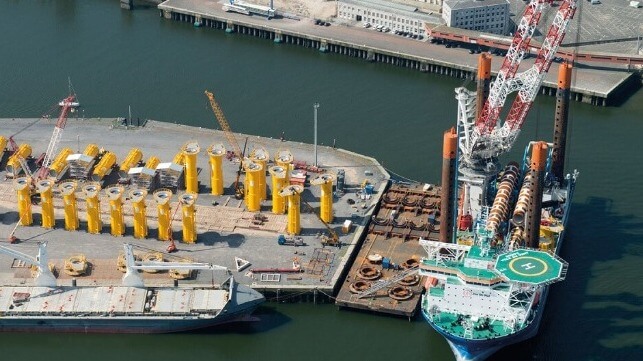ESPO Calls for Including Europe's Wind & Green Energy Ports in TEN-T

The European Sea Ports Organisation (ESPO) is warning that a proposed revision to the EU's cornerstone Trans-European Transport Network (TEN-T) policy could put seaports that focus on offshore wind at a disadvantage, particularly when compared with ports that focus on high-volume fossil fuel commodities.
At present, European ports are included in the list of TEN-T designated entities if they handle enough cargo tonnage or TEU volume. These criteria favor traditional liquid bulk (oil), dry and containerized cargoes. However, smaller ports that handle offshore wind construction and maintenance can be excluded from TEN-T's benefits (like grant funding) because they do not move enough mass across the pier - even if they are critical to the EU's green transition, according to ESPO.
The EU Parliament's Transport Committee is taking up revisions to the TEN-T policy on Friday, and ESPO says that it has "repeatedly pleaded" with the body to reassess the role of wind ports in this key Europe-wide transport framework.
"ESPO believes it is time to also take into account the crucial role ports play as hub in the green transition and Europe’s security of energy supply," the organization said in a statement. "By counting only tonnes in ports, the TEN-T policy risks to ignore the importance of ports in building and strengthening the supply chain for the new energy landscape."
The organization argues that it is time to recognize the investments that smaller green energy-focused ports are making in specialized infrastructure for offshore wind and green hydrogen. Without TEN-T recognition, these ports are at a disadvantage when it comes to securing European Union support for their initiatives, while ports that handle conventional energy cargoes have access to funding.

that matters most
Get the latest maritime news delivered to your inbox daily.
"We can’t build out offshore wind without also expanding and upgrading Europe’s port infrastructure. TEN-T must acknowledge that," said WindEurope CEO Giles Dickson. "Essential operation and maintenance activities are not covered under the current criteria for ports to access the TEN-T network. MEPs must address this issue. TEN-T should include metrics that are in line with Europe’s decarbonisation objectives.”
The European Council - the political body comprised of representatives of EU member state governments - has already proposed language that would increase the number of green energy-focused ports in the TEN-T network. Under the Council's version of the proposed revisions, a seaport could qualify for TEN-T if energy diversification or "acceleration of the roll-out of renewable energies" are among its main activities, so long as the port moves at least 500,000 tonnes of cargo per year.
